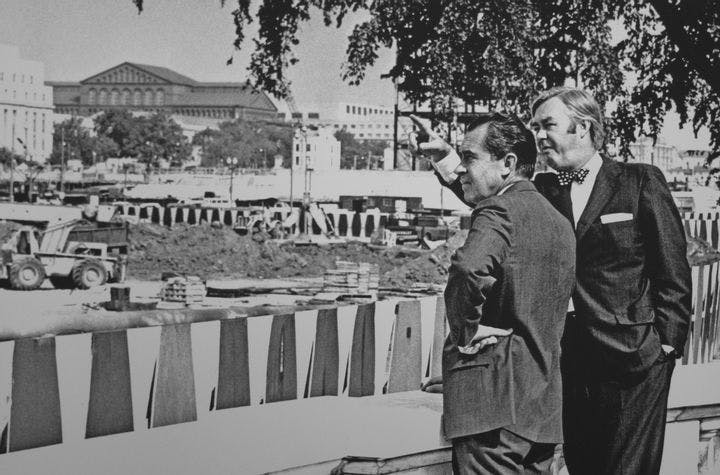Winter 2011
The Thinking Man's Politician
– Steven Lagerfeld
Daniel Patrick Moynihan was the kind of figure who almost makes you wish there were more intellectuals in American political life. But there could only be one Daniel Patrick Moynihan.
Daniel Patrick Moynihan was the kind of figure who almost makes you wish there were more intellectuals in American political life. The problem is, there was only one Moynihan. Professor, bureaucrat, presidential adviser, ambassador, and finally U.S. senator from New York from 1977 to 2001, he could as easily write a White House memo citing Jean Paul Sartre as a warm note to Tammany Hall’s Carmine DeSapio, telling the imprisoned New York City Democratic Party boss in 1972 how sorry he was to hear that federal authorities had denied his request for parole. “If you are ever around Boston,” he wrote, “you should know you have a friend on the Harvard faculty.”
At the time, Moynihan (1927–2003) was enjoying one of his brief sojourns in the academy, having served as domestic policy adviser to President Richard M. Nixon and in lower-level jobs under Presidents Lyndon B. Johnson and John F. Kennedy. Soon he would become the U.S. ambassador to India, and then ambassador to the United Nations, where his angry, eloquent (and unsuccessful) crusade against that body’s infamous 1975 resolution declaring that “Zionism is racism” made him a hero to many and probably won him his seat in the Senate.
Just to list these accomplishments—and the list does not include his 18 books and much else—is enough to leave one panting for breath. I’m happy to report that this collection of Moynihan’s letters, journal entries, and other writings, superbly edited by former New York Times reporter and editor Steven R. Weisman, is an apt, even riveting testament to Moynihan’s public life. Weisman’s succinct introductions weave the entries into something like a Moynihan memoir. The book displays all the man’s energy, wit, wide-ranging interests, and determination, along with (to Weisman’s great credit) his weaknesses—his insecurities, political flattery, and occasional whining. It’s as vivid a portrait of a political life as you could ask for.
Some have called Moynihan a gadfly, but the writings collected in this volume underline the constancy of his concerns. Moynihan’s father deserted the family when Moynihan was 10, and his boyhood in a single-parent working-class family, in Manhattan’s rough-and-tumble Hell’s Kitchen neighborhood, influenced everything he thought. In 1965, as an aide in the Johnson Labor Department, Moynihan wrote the memo that still, for many, defines his career. Alarmed by the rapidly rising number of black families without a father present, Moynihan called for “national action”—and was branded a racist for pointing out the unpleasant facts about the plight of the black family.
Moynihan’s reality-based politics made him a critic of orthodox liberalism as it developed during the 1960s. One of the most extraordinary entries in this volume is his anguished letter to Edward Kennedy after the assassination of Robert Kennedy, accusing the slain leader of having abandoned the “tradition of stable, working-class urban politics”—“your people,” he reminded Ted—for the voguish liberal “salons of Central Park West.” (It appears the letter was not sent.)
Moynihan followed his own path. He worked steadily for welfare reform, yet bitterly opposed the Clinton administration’s 1996 welfare overhaul as disastrously harsh. (He wasn't always right.) After the end of the Cold War, he campaigned relentlessly for a larger role for international law and against excessive government secrecy and the CIA, which he regarded as an incompetent monstrosity.
One cannot turn many pages in this collection before coming upon yet another letter or memo penned in pursuit of one more of Moynihan’s abiding concerns: his goal of creating public architecture symbolizing the “dignity, enterprise, vigor, and stability” of American government, and especially his long campaign, inspired by President Kennedy, to revive a bedraggled Pennsylvania Avenue. He prevailed. The nation’s splendid “Main Street” runs past my office at the Woodrow Wilson International Center for Scholars, an institution Moynihan was instrumental in creating, which itself is only one tenant in a large, handsome Moynihan-inspired building bordering the avenue. These are stirring achievements.
Moynihan was fortunate enough to see a good number of his words become deeds, but even those that did not are a powerful reminder in these rhetoric-filled times of the importance of considered ideas in public life—and the rare people who put them there.
* * *
Steven Lagerfeld is the editor of The Wilson Quarterly.
Reviewed: "Daniel Patrick Moynihan: A Portrait in Letters of an American Visionary" edited by Steven R. Weisman, PublicAffairs, 2010.
Photo courtesy of Flickr/Cliff
